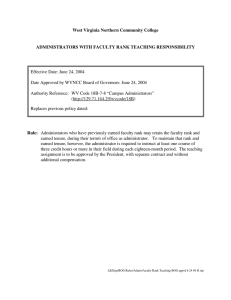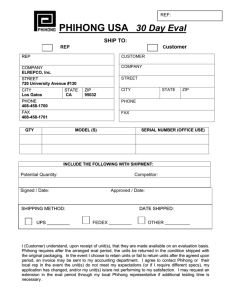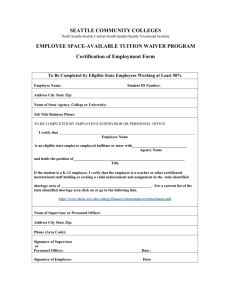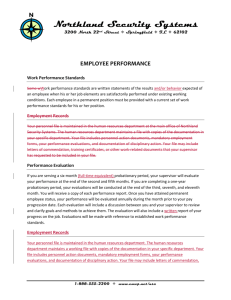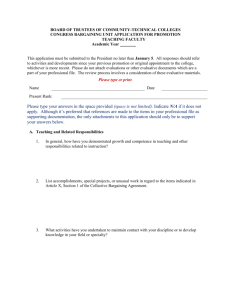Effective Date: January 23, 2003 West Virginia Northern Community College
advertisement
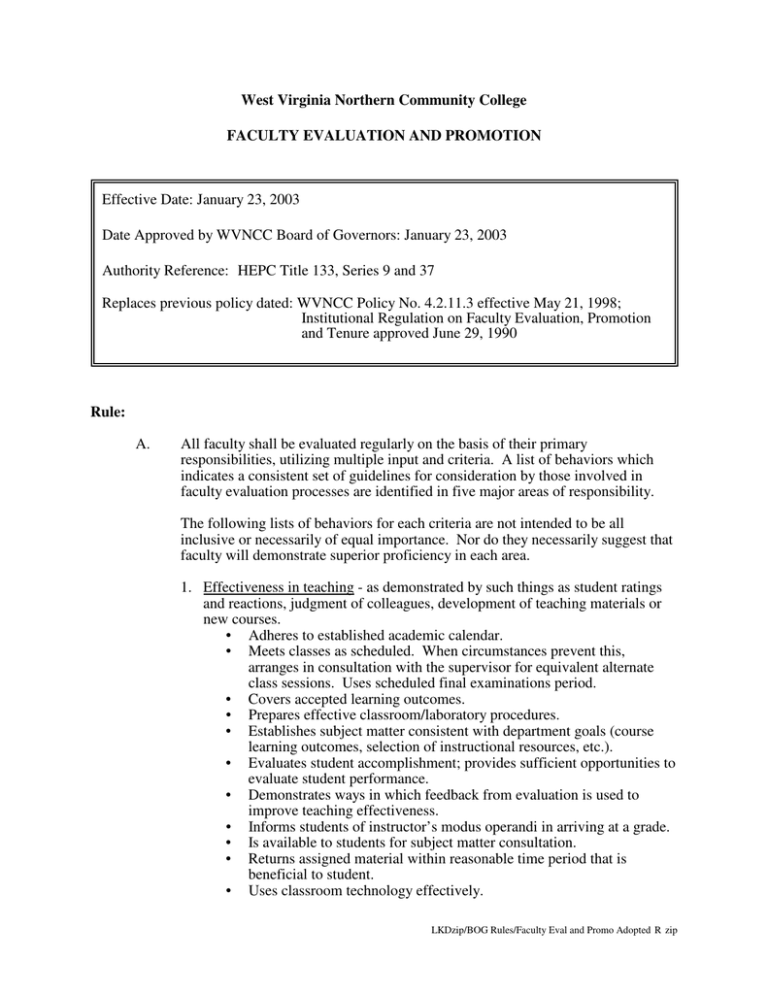
West Virginia Northern Community College FACULTY EVALUATION AND PROMOTION Effective Date: January 23, 2003 Date Approved by WVNCC Board of Governors: January 23, 2003 Authority Reference: HEPC Title 133, Series 9 and 37 Replaces previous policy dated: WVNCC Policy No. 4.2.11.3 effective May 21, 1998; Institutional Regulation on Faculty Evaluation, Promotion and Tenure approved June 29, 1990 Rule: A. All faculty shall be evaluated regularly on the basis of their primary responsibilities, utilizing multiple input and criteria. A list of behaviors which indicates a consistent set of guidelines for consideration by those involved in faculty evaluation processes are identified in five major areas of responsibility. The following lists of behaviors for each criteria are not intended to be all inclusive or necessarily of equal importance. Nor do they necessarily suggest that faculty will demonstrate superior proficiency in each area. 1. Effectiveness in teaching - as demonstrated by such things as student ratings and reactions, judgment of colleagues, development of teaching materials or new courses. • Adheres to established academic calendar. • Meets classes as scheduled. When circumstances prevent this, arranges in consultation with the supervisor for equivalent alternate class sessions. Uses scheduled final examinations period. • Covers accepted learning outcomes. • Prepares effective classroom/laboratory procedures. • Establishes subject matter consistent with department goals (course learning outcomes, selection of instructional resources, etc.). • Evaluates student accomplishment; provides sufficient opportunities to evaluate student performance. • Demonstrates ways in which feedback from evaluation is used to improve teaching effectiveness. • Informs students of instructor’s modus operandi in arriving at a grade. • Is available to students for subject matter consultation. • Returns assigned material within reasonable time period that is beneficial to student. • Uses classroom technology effectively. LKDzip/BOG Rules/Faculty Eval and Promo Adopted R zip Faculty Evaluation and Promotion Page 2 2. Mastery of subject matter - as demonstrated by such things as advanced degrees, licenses, honors, awards, and reputation in the subject matter field. • Has degree(s) or appropriate trade experience allocable to appointment or is working on such a degree or experience. • Holds licensure in applicable field or is working on such licensure where applicable. • Belongs to professional/trade organizations. 3. Scholarly ability/activity - as demonstrated by such things as success in contribution to the arts or technology, publications, and reputation among colleagues. • Reads professional/trade journals. • Shares with colleagues effective teaching approaches and devices. 4. Continuing growth - as demonstrated by such things as reading, research, courses or other activities to keep abreast of current developments in his/her field and the ability to successfully handle increased responsibility. • Conducts personal evaluation of teaching effectiveness and improves performance in weak areas. • Attends workshops, seminars, and training sessions in subject matter field. • Continues formal education through course work in field of specialization or related area. 5. Effectiveness of College Service - as demonstrated by such things as successful committee work, participation in local and College governance, administrative work, and work with students or community in addition to formal teacher-student relationships. • Attends faculty meetings (department and College). • Serves on department and College committees. • Carries the required College workload. • Advises students properly and in a timely manner. • Promotes College and departmental programs (academic tours/high school visitations, etc.). • Is involved in college and community activities. B. WVNCC uses a faculty rank system of the following rank appointments for full-time faculty: Instructor, Assistant Professor, Associate Professor, Professor. It is intended that the procedure for selecting individuals for promotion in rank will be a very deliberate process involving evaluations by self, students, supervisors, peers, Promotion Committee, and the College President. The primary responsibility for determining whether an individual fulfills the qualifications for a higher rank rests with the individual’s supervisor and the Promotion Committee. An evaluation of an individual’s effectiveness in teaching, professional development, and service needs to be as objective as possible. This will entail a general practice of having self, student, supervisor, and peer evaluations in LKDzip/BOG Rules/Faculty Eval and Promo Adopted R zip Faculty Evaluation and Promotion Page 3 order to be as fair as possible. A Promotion Committee shall make its evaluation, influenced to a considerable extent by the review of the above-mentioned evaluations which are submitted as part of the individual’s promotion package. Similarly the President will make evaluations which are based primarily on these recommendations. SEE ADDENDUM ON EVALUATION FOR PROCEDURES AND FORMS LKDzip/BOG Rules/Faculty Eval and Promo Adopted R zip
